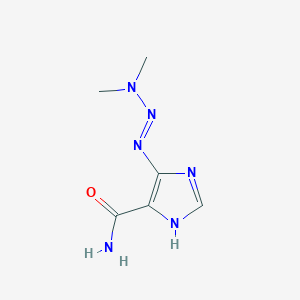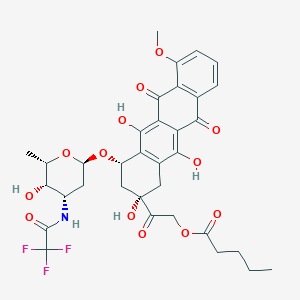| 1 |
Recurrent recessive mutation in deoxyguanosine kinase causes idiopathic noncirrhotic portal hypertension.Hepatology. 2016 Jun;63(6):1977-86. doi: 10.1002/hep.28499. Epub 2016 Mar 31.
|
| 2 |
Dacarbazine FDA Label
|
| 3 |
FDA Approved Drug Products from FDA Official Website. 2009. Application Number: (ANDA) 075259.
|
| 4 |
Natural products as sources of new drugs over the last 25 years. J Nat Prod. 2007 Mar;70(3):461-77.
|
| 5 |
Valrubicin FDA Label
|
| 6 |
Drugs@FDA. U.S. Food and Drug Administration. U.S. Department of Health & Human Services. 2015
|
| 7 |
Dacarbazine causes transcriptional up-regulation of interleukin 8 and vascular endothelial growth factor in melanoma cells: a possible escape mechanism from chemotherapy. Mol Cancer Ther. 2003 Aug;2(8):753-63.
|
| 8 |
Predicting the myelotoxicity of chemotherapy: the use of pretreatment O6-methylguanine-DNA methyltransferase determination in peripheral blood mono... Melanoma Res. 2011 Dec;21(6):502-8.
|
| 9 |
Study on mesenchymal stem cells mediated enzyme-prodrug gene CYP1A2 targeting anti-tumor effect. Zhonghua Xue Ye Xue Za Zhi. 2009 Oct;30(10):667-71.
|
| 10 |
Metabolic activation of dacarbazine by human cytochromes P450: the role of CYP1A1, CYP1A2, and CYP2E1. Clin Cancer Res. 1999 Aug;5(8):2192-7.
|
| 11 |
Role of cytochrome P450 isoenzymes in metabolism of O(6)-benzylguanine: implications for dacarbazine activation. Clin Cancer Res. 2001 Dec;7(12):4239-44.
|
| 12 |
Serum bcl-2 and survivin levels in melanoma. Melanoma Res. 2004 Dec;14(6):543-6. doi: 10.1097/00008390-200412000-00017.
|
| 13 |
CD69 on CD56+ NK cells and response to chemoimmunotherapy in metastatic melanoma. Eur J Clin Invest. 2007 Nov;37(11):887-96. doi: 10.1111/j.1365-2362.2007.01873.x.
|
| 14 |
Pharmacokinetic, biochemical and clinical effects of dimethyltriazenoimidazole-4-carboxamide-bischloroethylnitrosourea combination therapy in patients with advanced breast cancer. Int J Cancer. 2003 Feb 20;103(5):686-92. doi: 10.1002/ijc.10849.
|
| 15 |
Mcl-1 antisense therapy chemosensitizes human melanoma in a SCID mouse xenotransplantation model. J Invest Dermatol. 2003 Jun;120(6):1081-6. doi: 10.1046/j.1523-1747.2003.12252.x.
|
| 16 |
Impairment of APE1 function enhances cellular sensitivity to clinically relevant alkylators and antimetabolites. Mol Cancer Res. 2009 Jun;7(6):897-906. doi: 10.1158/1541-7786.MCR-08-0519. Epub 2009 May 26.
|
| 17 |
Glut-1 as a therapeutic target: increased chemoresistance and HIF-1-independent link with cell turnover is revealed through COMPARE analysis and metabolomic studies. Cancer Chemother Pharmacol. 2008 Mar;61(3):377-93. doi: 10.1007/s00280-007-0480-1. Epub 2007 May 23.
|
| 18 |
Exposure of melanoma cells to dacarbazine results in enhanced tumor growth and metastasis in vivo. J Clin Oncol. 2004 Jun 1;22(11):2092-100. doi: 10.1200/JCO.2004.11.070. Epub 2004 May 3.
|
| 19 |
Clusterin regulates drug-resistance in melanoma cells. J Invest Dermatol. 2005 Jun;124(6):1300-7. doi: 10.1111/j.0022-202X.2005.23720.x.
|
| 20 |
Functional erythropoietin autocrine loop in melanoma. Am J Pathol. 2005 Mar;166(3):823-30. doi: 10.1016/S0002-9440(10)62303-6.
|
| 21 |
Metabolic activation of N-acylanthracyclines precedes their interaction with DNA topoisomerase II. NCI Monogr. 1987;(4):111-5.
|
| 22 |
A multifactorial approach to hepatobiliary transporter assessment enables improved therapeutic compound development. Toxicol Sci. 2013 Nov;136(1):216-41.
|
| 23 |
Biologically active neutrophil chemokine pattern in tonsillitis.Clin Exp Immunol. 2004 Mar;135(3):511-8. doi: 10.1111/j.1365-2249.2003.02390.x.
|
|
|
|
|
|
|


